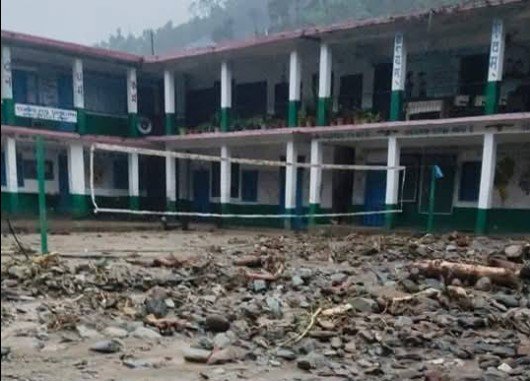Himachal Pradesh is reeling under one of the most devastating phases of this monsoon, but what stands out more than the destruction is the deafening silence of the government. As floods and landslides sweep through Kullu, Mandi and surrounding districts, washing away homes, roads and livelihoods, the people of the state are left battling not just the fury of nature but the indifference of those in power. Entire stretches of the crucial Chandigarh–Manali highway now lie buried under debris, local markets have drowned under layers of mud, and families are standing outside their broken homes with nothing but despair in their eyes. Yet, the government’s response is reduced to statements and promises that ring hollow against the cries of helpless citizens.
The tragedy unfolding in Kullu’s Pahanala, where sudden floods tore through habitations, and in Mandi’s Nagwain, Aut and Takoli areas, where torrents of mud and water choked life, is not a natural calamity in isolation. It is also a story of failed preparedness, poor planning and lack of accountability. Year after year, Himachal Pradesh suffers under the same cycle of disaster, but the authorities continue to ignore warnings, overlook structural vulnerabilities and leave ordinary people to pay the price. When floodwaters entered Takoli’s main vegetable market, wiping out livelihoods overnight, and when offices and homes were filled with sludge, the only visible action came from terrified locals trying to save each other, not from government agencies that should have been on the ground.
The silence of those in power is becoming unbearable for the people. Families who lost vehicles, homes and everything they owned watched the torrents swallow their world within minutes. In Aut’s Saranala, even the compound walls of a major infrastructure company collapsed under the rush of water, leaving its employees running for their lives. If private workers could barely escape, what chances did local villagers have? Questions that demand urgent answers are being brushed aside by officialdom, while the ground reality grows darker by the hour.
Today, people are literally stranded on broken highways, cut off from essential supplies, but the political establishment has yet to show urgency. Rescue teams are slow, relief camps remain inadequate, and rehabilitation is far from sight. When citizens are standing on the roads, watching their lives float away in muddy waters, is it enough for the state administration to shrug responsibility and blame it all on nature? Or should accountability not be fixed on why embankments were weak, why drainage systems failed, why no early-warning systems worked, and why entire markets and houses could be left at the mercy of raging floods?
The floods in Himachal Pradesh are not just about water, landslides and broken bridges. They are about a government that has failed to rise to the moment, a leadership that has chosen silence over empathy, and a political class that treats human tears as if they hold no value. Each day of inaction deepens the wound and strengthens the perception that the state is abandoned in its darkest hour. When vehicles lie submerged, roads resemble rivers, and families sit helplessly with mud in their homes, the least people expect is visible action, not apathy.
This crisis, unfolding in the hills, is a reminder that nature’s fury cannot always be tamed, but human responsibility must always be upheld. Opposition voices have begun asking hard questions—where is the government’s disaster management machinery, why are people left to fend for themselves, and why does silence greet every plea for urgent help? These are questions that must echo not just in political rallies but in the conscience of those sitting in power. If governance fails when people need it the most, then what remains of governance at all?
The people of Himachal are not looking for sympathy; they are demanding accountability. Their broken homes, ruined markets, and destroyed roads are not just statistics to be quoted in official reports but the living evidence of a failed system. If today’s tragedy does not awaken those in charge, then tomorrow’s disasters will not just be natural—they will be political. And in that, the government cannot escape blame.




